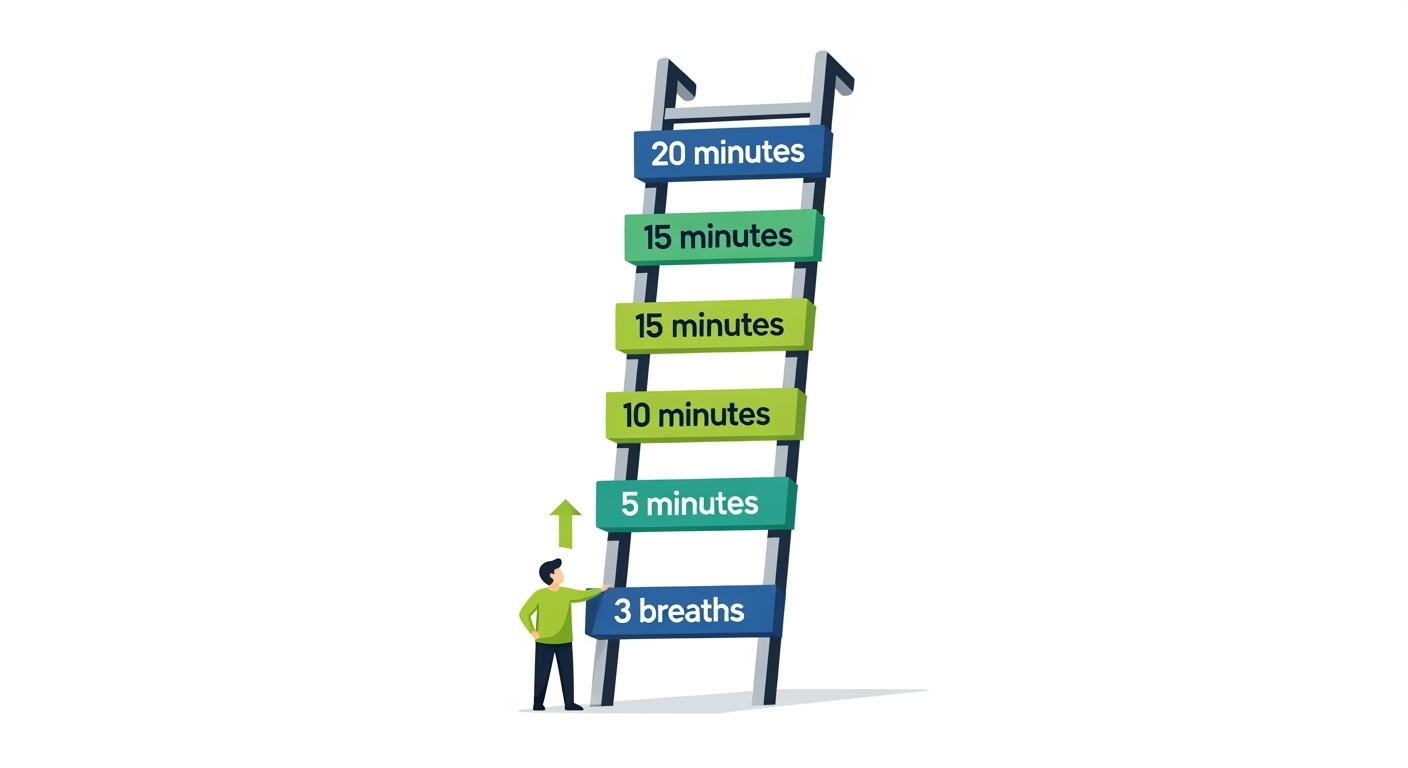Table of Contents
Master micro habits recovery with 5 proven practices for sustainable mindset development. Learn science backed techniques to bounce back from setbacks and build lasting resilience in minutes daily.
Marcus sat staring at his phone at 2 AM, overwhelmed by familiar defeat. Forty three days of consistent morning meditation, gone. One stressful week, and everything unraveled. He stopped journaling, skipped evening walks, and doom scrolled until dawn.
“I’ll start Monday,” he promised himself. But Monday came and went.
If this resonates with you, here’s the truth: the problem wasn’t breaking the habit. It was lacking a recovery system to bounce back.
Most habit advice obsesses over building streaks and maintaining consistency. But what happens when life inevitably disrupts your routine? Without recovery practices, a single missed day spirals into weeks of abandonment and crushing self judgment.
This guide reveals five transformative recovery practices for bouncing back from setbacks and creating sustainable mindset development that strengthens rather than shatters when you stumble.
Understanding Recovery: Why Bouncing Back Matters More Than Streaks.
Traditional habit psychology emphasizes consistency above all else. Never break the chain. Don’t miss twice. While these principles have merit, they create dangerous fragility: when you inevitably miss a day, the entire psychological framework collapses.
Recovery focused practices work differently. They acknowledge that setbacks are guaranteed and build your capacity to return quickly rather than avoid failure entirely.
The Neuroscience of Habit Disruption.
When you break a habit streak, your brain doesn’t just lose the behavior pattern. Research from the University of Michigan reveals that interruptions trigger “extinction learning,” where neural pathways associated with the behavior begin weakening. Miss three consecutive days, and your brain starts treating the routine as no longer relevant.
But here’s the insight: recovery can reactivate dormant neural pathways faster than building them from scratch. Your brain retains a “memory” of the previous behavior, and strategic recovery practices tap into this neurological residue, allowing you to rebuild momentum in days rather than months.
Why Sustainable Mindset Development Requires Recovery.
Sustainable mindset development means building mental patterns with micro habits that strengthen over time rather than requiring constant maintenance. The difference is profound:
Maintenance mindset: “I must meditate every morning or I’ll lose my mental clarity.”
Sustainable mindset: “Meditation supports my clarity. When I miss sessions, I have practices to return quickly and learn from the interruption.”
Recovery creates antifragility, systems that grow stronger through stress and disruption. Each time you practice micro habits recovery, you’re building metacognitive skills: awareness of patterns, compassion for humanity, and strategic thinking about growth.
The 5 Best Micro habits Recovery Practices for Sustainable Mindset Development.
Micro habits Recovery Practice 1: The Two Minute Return Ritual.

The moment you realize you’ve broken a habit streak, negative self talk begins. “I failed again.” “Why can’t I be consistent?” This compounds the original disruption, turning a single missed day into weeks of abandonment.
The Two Minute Return Ritual interrupts this cycle by creating an immediate, shame free pathway back.
How it works: The instant you notice you’ve broken a habit (whether it’s been one day or thirty), you perform a two minute version right then, regardless of time or circumstance.
Actionable examples:
- Missed morning meditation? Do two minutes of conscious breathing at your desk, even if it’s 3 PM
- Skipped your workout? Do ten jumping jacks immediately, regardless of what you’re wearing
- Abandoned journaling? Write three sentences about current feelings in your phone’s notes
- Stopped reading? Read one paragraph of any book or article within reach
- Neglected gratitude practice? Think of one thing you appreciate right now
Why it works: This ritual accomplishes three psychological goals. First, it prevents the “waiting for perfect conditions” trap. You don’t need morning or motivation just two minutes and willingness.
Second, it rebuilds self efficacy, your belief in your ability to execute intended behaviors. Each return creates evidence that contradicts the “I’m not disciplined” narrative.
Third, it reactivates neural pathways before extinction learning completes. Those connections don’t disappear instantly; they enter a “dormant but recoverable” state. Quick returns wake them up before they fully degrade.
Common mistakes: Waiting for the “right time” to restart (the right time is always now), making the ritual too elaborate (two minutes maximum), or trying to “make up” for missed days by doing triple the work.
Progression tips: After successfully using this ritual five times, you’ll notice the gap between breaking and returning shortens dramatically. Eventually, you’ll return the same day, then within hours, then within minutes.
Micro habits Recovery Practice 2: The Compassionate Inquiry Method.

When habits break, most people spiral into harsh self criticism. “I’m so lazy.” “I have no discipline.” Research from Dr. Kristin Neff at the University of Texas reveals self criticism depletes motivation and increases the likelihood of giving up entirely.
The Compassionate Inquiry Method replaces judgment with curiosity, transforming setbacks into valuable data.
How it works: Within 24 hours of breaking a habit, spend five minutes asking yourself specific, non judgmental questions about what happened.
Actionable inquiry framework:
- Identify the trigger: “What was happening when the habit broke?” (stress, illness, travel, emotional upheaval)
- Notice the pattern: “Have I broken this habit in similar circumstances before?”
- Assess your needs: “What did I need in that moment that felt more urgent?”
- Evaluate the system: “What made it hard to continue, and what would make it easier to return?”
- Plan one adjustment: “What’s the smallest change I could make to support future recovery?”
Why it works: Compassionate Inquiry activates your prefrontal cortex, the brain region responsible for executive function and problem solving, rather than your amygdala, which processes threat and triggers shame spirals. When you’re curious rather than critical, your brain shifts from defense mode to learning mode.
This practice also builds metacognitive awareness, the ability to observe your own thinking patterns. Over time, you start noticing warning signs before habits break entirely.
Dr. Shauna Shapiro’s research at Santa Clara University found that self compassion practices increase motivation and goal achievement by 43 percent compared to self criticism approaches.
Pitfalls to avoid: Disguising self criticism as inquiry (“Why am I such a failure?” isn’t compassionate curiosity), over analyzing instead of acting, or using inquiry as procrastination.
Layering with other practices: The Compassionate Inquiry Method pairs powerfully with the Two Minute Return Ritual. Use the Return Ritual immediately when you notice a break, then conduct inquiry within 24 hours to understand what happened.
Read “Thankfulness: 7 Powerful Gratitude Habits for Strength Gains.”
Micro habits Recovery Practice 3: The Minimum Viable Habit Reset.

One of the most destructive patterns in habit recovery is the all or nothing trap. You were doing 30 minutes of daily exercise, then missed a week. Returning feels impossible because 30 minutes now seems overwhelming. So you wait for inspiration, and weeks turn into months.
The Minimum Viable Habit Reset prevents this paralysis by temporarily scaling your habit down to its absolute minimum expression.
How it works: When returning from a break, you consciously reduce the habit to the smallest possible action that still maintains its essential character.
Actionable examples:
- Original: 30-minute workout → Minimum viable: 5 bodyweight squats,
- Original: 10-page reading → Minimum viable: 2 sentences,
- Original: 20-minute meditation → Minimum viable: 3 conscious breaths,
- Original: Elaborate meal prep → Minimum viable: Prepare one healthy snack,
- Original: 30-minute creative writing → Minimum viable: Write one descriptive sentence,
Implementation protocol:
- Identify your broken habit and its original scope,
- Ask: “What’s the smallest action that would still count as doing this?”,
- Commit to the minimum version for exactly 7 days,
- After 7 consecutive days, reassess: “Can I add 10% more, or should I continue at this level?”,
- Increase gradually in 10% increments, never jumping back to the original scope immediately,
Why it works: This reset eliminates the intimidation barrier. Your brain can’t generate convincing excuses to avoid three conscious breaths. The resistance is simply too low.
It also maintains what James Clear calls “identity votes.” Each time you execute even the minimum version, you’re reinforcing: “I am someone who meditates” or “I am someone who writes.” These identity votes compound over time.
Research from BJ Fogg at Stanford’s Behavior Design Lab demonstrates that tiny behaviors sustained over time create more lasting change than large behaviors practiced inconsistently. His methodology found that people who scaled habits down during difficult periods were 73 percent more likely to return to full practice.
Common mistakes: Feeling embarrassed about the minimum version (ego is the enemy of recovery), skipping the 7-day minimum period and jumping back to full intensity, or viewing the scaled down habit as failure rather than intelligent adaptation.
Advanced layering: After successfully using this reset three times, you’ll start recognizing early warning signs that signal when to proactively scale down before breaking entirely.
Micro habits Recovery Practice 4: The Resilience Reflection.
Most people only think about their habits when they’re broken. The Resilience Reflection flips this script by creating a weekly practice specifically for assessing, celebrating, and adjusting your habit system before problems compound.
How it works: Every Sunday evening (or whatever day closes your week), spend 10 minutes reviewing your habit practice with structured questions.
The weekly reflection framework:
Celebration (2 minutes)
- Which habits did I practice this week, even imperfectly?
- What’s one moment I felt proud of my recovery or consistency?
- Which small win deserves acknowledgment, even if no one else noticed?
Observation (3 minutes)
- Which habits felt easy and natural this week?
- Which required significant effort or willpower?
- Did I break any habits? If so, how quickly did I return?
- What patterns do I notice in when/where/why habits break?
Adjustment (3 minutes)
- Is there one habit that needs to be made easier or smaller?
- Is there one environmental change that would reduce friction?
- Do I need to add a recovery practice to my system?
- What’s one tiny experiment I could try this coming week?
Forward Focus (2 minutes)
- What’s my primary intention for the upcoming week?
- What potential disruptions do I see coming (travel, deadlines, events)?
- What’s my contingency plan if those disruptions happen?
- How will I practice self compassion if habits break?
Why it works: This reflection creates what psychologists call “prospective memory,” priming your brain to notice habit relevant situations before they unfold. Weekly check ins catch drift early, when course corrections are still easy.
Research from Dr. Gail Matthews at Dominican University found that people who did weekly progress reflections were 76 percent more likely to achieve their goals than those who didn’t create structured review systems.
Common pitfalls: Turning reflection into harsh self evaluation (remember: curiosity, not criticism), skipping celebration to focus only on problems, or making adjustments without testing them.
Creating your reflection ritual: Pair your Resilience Reflection with something pleasant to make it sustainable. Brew your favorite tea, light a candle, or do it in a comfortable spot. The ritual should feel nourishing rather than like homework.
Micro habits Recovery Practice 5: The Community Accountability Loop.

Humans are fundamentally social creatures, and our behaviors are profoundly influenced by the people around us. Yet most habit systems treat formation as solitary work, missing the powerful motivational force of community accountability.
The Community Accountability Loop creates social structures that support both consistency and recovery.
How it works: Establish a simple system where you share your habit practice and recovery experiences with at least one other person.
Implementation options:
Daily Check-In Partner: Find one person pursuing similar habits. Text each evening: “Today I [habit completed] / [habit missed but recovered with] / [habit broken].” Response is always acknowledgment without judgment. Duration: 3 minute maximum daily investment.
Weekly Recovery Circle: Create a small group (3-5 people) that meets weekly for 20 minutes to share what habits you’re practicing, what broke, how you recovered, and what you learned. No advice giving unless explicitly requested.
Recovery Buddy System: Partner with one person who explicitly agrees to support habit recovery. When you break a habit, text within 24 hours. Their job: remind you of your Two Minute Return Ritual and compassionate inquiry questions.
Async Accountability Thread: Join or create an online community (Reddit, Discord, private Facebook group) focused on habit recovery. Post weekly updates about your practice, celebrating wins and discussing struggles. Duration: 10-15 minutes weekly.
Why it works: Social accountability activates multiple powerful psychological mechanisms. First, the mere presence of witnesses makes you more likely to follow through. This isn’t about shame; it’s about identity reinforcement.
Second, hearing others’ struggles with recovery normalizes your own setbacks. When your accountability partner shares that they’ve broken their habit three times this month but kept returning, it dismantles the toxic narrative that “everyone else has discipline except me.”
Third, community creates what researchers call “positive behavioral contagion.” When you witness others recovering quickly from setbacks, you unconsciously absorb that behavior pattern. Mirror neurons in your brain literally fire as if you’re experiencing their recovery yourself.
A landmark study from the Framingham Heart Study tracked 12,000 people over 32 years and found that behaviors spread through social networks like viruses. If your friend’s friend’s friend develops a positive habit, you’re 6 percent more likely to develop that habit too.
Common mistakes: Choosing accountability partners who emphasize perfection over resilience, using accountability as disguised competition, or only sharing wins and hiding struggles (vulnerability is where connection happens).
Layering all five practices: The Community Accountability Loop amplifies every other recovery practice in this guide. Share your Two Minute Return Rituals with your community. Discuss insights from your Compassionate Inquiry. Ask for feedback when implementing resets. Review your Resilience Reflections together.
Read more articles from our “Mindset Development” category.
Creating Your Personal Recovery System.
Micro habits Step 1: Choose ONE recovery practice based on your biggest challenge. If breaks trigger shame, start with Compassionate Inquiry. If you struggle to return, prioritize the Two Minute Return Ritual. If habits feel overwhelming, implement the Minimum Viable Reset.
Micro habits Step 2: Commit for 8 weeks. Recovery practices are themselves habits requiring formation. Give your chosen practice two months to become automatic before adding others.
Micro habits Step 3: Design your recovery environment. Keep a “Recovery Journal” for reflections. Set a phone reminder labeled “Return Is Always Possible.” Create a note titled “My Minimum Viable Versions” listing scaled down options.
Micro habits Step 4: Celebrate recovery as much as consistency. “I broke my routine but returned within 2 hours!” deserves recognition. Each recovery moment represents skills that consistency alone cannot teach: adaptability, self compassion, strategic thinking, and resilience.
Common Recovery Obstacles and Solutions.
Obstacle: “I’ve broken the habit too many times; it’s not worth returning.”
Solution: Every return builds recovery skills, regardless of previous breaks. Use the Two Minute Return Ritual right now.
Obstacle: “I don’t have time for micro habits recovery practices.”
Solution: Recovery practices save enormous time by preventing weeks of abandonment. Start with just the Two Minute Return Ritual, it requires zero scheduled time.
Obstacle: “My life is too chaotic for any micro habit system.”
Solution: Chaos is precisely when recovery practices matter most. Use the Minimum Viable Reset on everything, including your recovery practices.
Obstacle: “I don’t have anyone to be accountable to.”
Solution: Send a simple text to one friend: “Hey, I’m working on building better habits. Would you be willing to receive one text per week where I share how my week went?”
Your 30 Day Action Plan.
Days 1-7: Choose and implement ONE recovery practice. Practice it at least once this week, even imperfectly. Success metric: You practiced your recovery technique at least once.
Days 8-14: Notice what triggers habit breaks and what makes recovery easier. Add one environmental support. Success metric: You can identify at least one pattern in your disruptions.
Days 15-21: Your recovery practice should start feeling natural. Experiment with combining practices. Success metric: Recovery after a break now takes hours or days, not weeks.
Days 22-30: Recovery operates mostly on autopilot. Assess whether you’re ready to add a second recovery practice. Success metric: You’ve recovered from at least 3-5 disruptions and can articulate what helped most.
Conclusion: From Fragile Streaks to Antifragile Systems.
The traditional micro habits narrative sells a comforting myth: if you remain disciplined enough and never break the chain, you’ll achieve your goals. But this creates fragility, shame, and eventual abandonment.
Recovery focused micro habits offer a different path: one that acknowledges your humanity, honors imperfect circumstances, and builds genuine resilience through practiced return rather than perpetual perfection.
When you implement these five micro habits recovery practices, setbacks stop feeling like catastrophes and start feeling like expected rhythms in a larger journey. The gap between breaking and returning shrinks from weeks to days to hours. Self judgment transforms into curiosity.
Marcus eventually discovered recovery practices. He still breaks habits regularly, life remains unpredictable. But now, when his meditation streak ends, he does a two minute session the same day. When overwhelm hits, he scales down to minimum viable versions without shame.
His micro habits aren’t perfect. But they’re sustainable. After two years of practicing recovery, he rarely goes more than 48 hours without returning to any habit.
That’s the promise of recovery focused practices: not perfection, but persistence. Not rigid streaks, but flexible resilience. Not fragile systems that shatter, but antifragile practices that strengthen through challenges.
Your micro habits recovery journey begins with a single action. Choose one recovery practice and commit to trying it imperfectly for the next eight weeks.
Which practice will you begin with today?
TOP 15 FAQ
-
What is an example of a micro habit?
Taking two mindful breaths before a task or writing one gratitude note daily — small, repeatable actions that create lasting change.
-
What is the 3 3 3 rule for habits?
It’s about balance: focus on 3 small daily habits, track them for 3 weeks, and reflect for 3 minutes to reinforce consistency.
-
What is a macro habit?
A macro habit is a large, life-shaping routine built from multiple micro habits, like a full fitness or morning ritual system.
-
What are micro performance habits?
They are small, repeatable behaviors that enhance focus, discipline, and resilience, the foundation of sustainable high performance.
-
Micro Habits book.
The concept popularized by books like Atomic Habits, small actions done consistently drive major long-term transformation.
-
Micro habits: self-improvement.
They work by shrinking goals into actions so simple they bypass resistance, helping you grow daily without burnout.
-
Micro habits examples.
Two minute meditation, one push up, journaling three sentences, tiny wins that maintain progress during setbacks.
-
Micro Habits app.
Use apps like Habitica or Streaks to track small actions daily. Focus on gentle recovery instead of perfection.
-
Micro habits for weight loss.
Start with one micro change, drinking water before meals or walking five minutes post-lunch, small actions sustain fat loss.
-
Micro habits movie.
While no direct movie exists, films like The Pursuit of Happyness portray persistence through micro actions and mindset recovery.
-
What are the benefits of identifying micro habits?
They make growth measurable, reduce overwhelm, and help you recover fast when routines break.
-
How do I recover from breaking a habit?
Use the Two Minute Return Ritual, do a smaller version of the habit instantly to rebuild confidence and momentum.
-
What is sustainable mindset development?
It’s training your mind to grow stronger from disruptions, using recovery focused micro habits instead of chasing perfection.
-
How do micro habits build resilience?
Each small recovery strengthens neural pathways and self trust, turning setbacks into opportunities for faster bounce back.
-
How long does it take to rebuild a broken habit?
With recovery systems like the Minimum Viable Reset, momentum can return within days instead of weeks.






